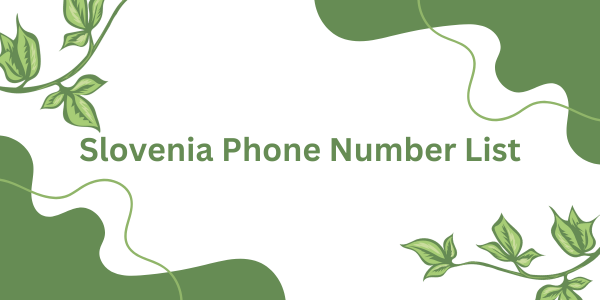|
|
Slovenia is an active and committed member of the European Union (EU), having joined on May 1, 2004. As one of the smallest EU member states, Slovenia has played a significant role in EU integration while benefiting from the union's political, economic, and social structures.
Economic Contributions and Benefits
Slovenia’s economy is closely integrated with the European Union. As Slovenia Phone Number List an EU member, Slovenia adopted the Euro (EUR) as its official currency in 2007, making it the first former Yugoslav republic to join the Eurozone. This monetary integration has strengthened trade and economic stability by facilitating cross-border commerce and attracting investment.
The European Union provides substantial financial support to Slovenia through programs like EU structural funds, which are used for infrastructure development, regional growth, and social policies. Slovenia has utilized these funds for modernization, economic development, and improving living standards, focusing on transport infrastructure, innovation, education, and rural development.
Political Engagement
Slovenia actively participates in the EU's political and decision-making processes. It contributes to shaping EU policies on topics such as migration, climate change, economic reform, and democracy. As a member of the Council of the European Union and other EU bodies, Slovenia engages in negotiations to ensure its national interests and perspectives are represented.

Social Policies and EU Initiatives
Slovenia has adopted numerous EU policies aimed at promoting equality, sustainability, and solidarity. It is actively involved in implementing EU initiatives, such as the European Green Deal and various social inclusion programs. Slovenia also participates in the Schengen Area, allowing for open borders and the free movement of people across most EU member states.
Regional and International Role
As part of the European Union, Slovenia strengthens regional cooperation, particularly in the Western Balkans, where it has historical and diplomatic ties. Slovenia supports EU enlargement in the region, contributing to stability and integration efforts.
Challenges and Adaptation
Like other EU members, Slovenia has faced challenges related to economic shifts, migration flows, and the COVID-19 pandemic. However, its membership in the European Union has equipped it with tools and mechanisms to address these challenges, including access to funding and strategic cooperation with other member states.
In conclusion, Slovenia's role in the European Union is multifaceted, focusing on economic stability, political participation, social development, and regional cooperation. As a small but engaged member, Slovenia contributes to the EU’s broader goals of unity, democracy, prosperity, and sustainable development.
|
|